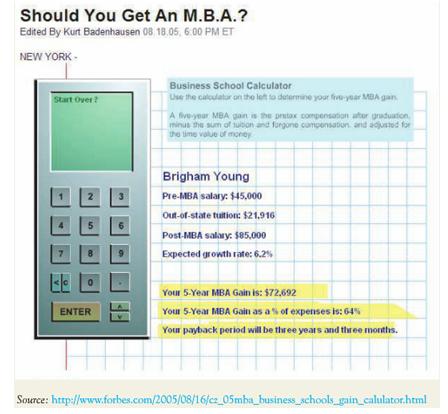Assume your friend Greg Ellis is thinking of getting an MBA. He is a resident of Arizona
Question:
Assume your friend Greg Ellis is thinking of getting an MBA. He is a resident of Arizona and is currently earning $45,000 per year. One of the schools Greg is considering is Brigham Young University (BYU) in Provo, Utah. He went to the Forbes website and used the “Should You Get an M.B.A.” decision tool to calculate the “five-year gain” from getting an MBA at BYU. The results of that analysis follow:

Greg was pleased to see that his five-year gain from getting an MBA was $72,692 and that the payback time on his investment would be just over three years. He is also considering a few other options:
• Getting a degree at Arizona State University (ASU) where he would qualify for in-state tuition. Greg believes his post-MBA salary would be the same with a degree from ASU as with one from BYU.
• Getting a degree at Harvard University. Greg believes he would be able to earn a higher starting salary (estimated at $100,000) with a Harvard degree.
Required:
1. Go to the Forbes website and calculate the five-year gain from getting an MBA at ASU.
State any assumption you are asked to make. Explain what factors caused the five-year gain to be higher or lower at ASU than at BYU.
2. Go to the Forbes website and calculate the five-year gain from getting an MBA at Harvard.
State any assumption you are asked to make. Explain what factors caused the five-year gain to be higher or lower at Harvard than at BYU.
3. The Forbes decision tool considers both out-of-pocket costs and opportunity costs. Give examples of each.
4. The Forbes decision tool also considers the time value of money. Without making specific calculations, explain how the time value of money is likely to differ for the Harvard and ASU alternatives. Remember that the up-front tuition is likely to be much lower at ASU than at Harvard, but the future benefits in terms of salary are likely to be higher at Harvard than ASU. How would these differences affect the time value of money?
5. Is the $45,000 pre-MBA salary relevant to Greg’s decision about whether to go to Harvard, ASU, or BYU? Why or why not?
6. Suppose that Greg was trying to decide whether to continue with his current career path or get an MBA. Is his current salary relevant to this decision? Why or why not?
Step by Step Answer:

Managerial Accounting
ISBN: 978-0078025518
2nd edition
Authors: Stacey Whitecotton, Robert Libby, Fred Phillips





